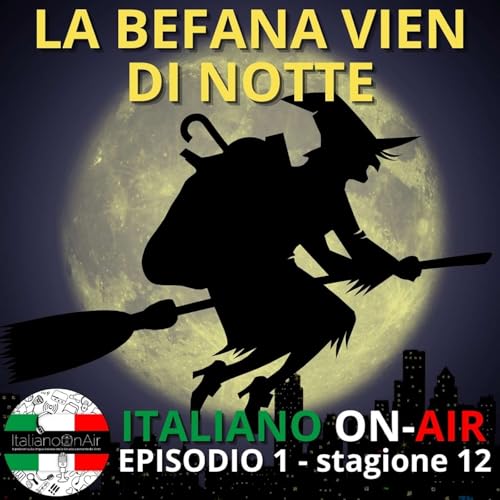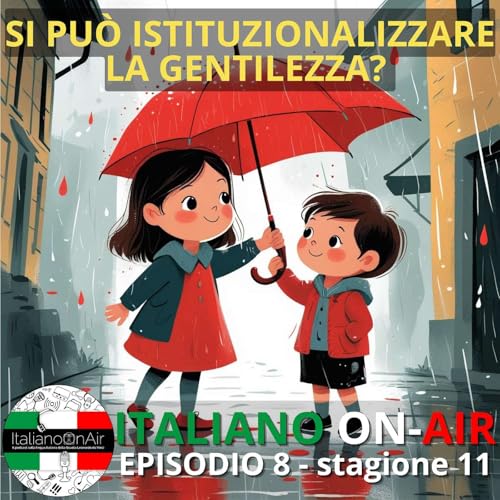Bentornati! Con questo episodio, inizia la stagione 12 di ITALIANO ON-AIR, che ci accompagnerà da gennaio fino alla fine di marzo, con tanti contenuti pensati per aiutarvi a migliorare il vostro italiano in modo naturale e piacevole.
Oggi è il 6 gennaio e qui in Italia si festeggia l’Epifania, una giornata speciale, molto sentita e legata alle tradizioni popolari. Per questo motivo, solo per questa settimana, l’episodio esce proprio oggi anziché il consueto mercoledì. Ma niente paura: dalla prossima settimana torneremo regolarmente con i nostri episodi ogni mercoledì!
In questa puntata parliamo dell’Epifania e della Befana🧹, una delle figure più amate del folclore italiano. Scopriremo le sue origini, tra tradizione cristiana e credenze pagane, e vedremo come si festeggia il 6 gennaio in diverse città d’Italia, da Roma a Firenze fino a Urbania, la casa della Befana.
Dal punto di vista linguistico, imparerete espressioni tipiche per raccontare leggende e tradizioni, come “la leggenda narra che”, seguita rigorosamente dal congiuntivo (e vedremo perché), e analizzeremo verbi e avverbi utili come simboleggiare e indubbiamente. Come sempre, arricchirete il vostro vocabolario con parole legate alle feste, alle tradizioni e alla cultura italiana.
Ripartiamo quindi insieme, proprio nel giorno in cui si dice che “l’Epifania tutte le feste si porta via”… ma la voglia di imparare l’italiano continua!
Buon ascolto e buona Befana 🎁🧹
L’episodio sui Krampus che citiamo nell’articolo è il 12 della stagione 8 si chiama “Natale di paura” e lo potete ascoltare a questo link: https://podcast.scuolaleonardo.com/natale-di-paura-episodio-12-stagione-8/
Trovate la trascrizione nella pagina dell'episodio, scorrendo in basso.
I nostri contatti
📧 podcast@scuolaleonardo.com
🎤 podcast.scuolaleonardo.com (puoi lasciarci un messaggio vocale)
📲 Facebook - Instagram - TikTok
----------- 🇬🇧 ENGLISH 🇺🇸------------
Welcome back! Season 12 of ITALIANO ON-AIR begins with this episode. It will run from January through the end of March, featuring a wealth of content designed to help you improve your Italian in a natural and enjoyable way.
Today is January 6, and here in Italy, we celebrate Epiphany, a special day that is deeply rooted in popular traditions. For this reason, the episode is being released today instead of our usual Wednesday, just for this week. But don’t worry: starting next week, we’ll be back to our regular Wednesday schedule!
In this episode, we talk about Epiphany and the Befana 🧹, one of the most beloved figures in Italian folklore. We’ll explore her origins—somewhere between Christian tradition and pagan beliefs—and see how January 6 is celebrated in different Italian cities, from Rome to Florence and all the way to Urbania, the home of the Befana.
From a language-learning perspective, you’ll learn typical expressions used to tell legends and traditional stories, such as “la leggenda narra che”, which is strictly followed by the subjunctive (and we’ll explain why). We’ll also look at useful verbs and adverbs, such as simboleggiare (“to symbolize”) and indubb
 5 min
5 min Jan 14 20266 min
Jan 14 20266 min 7 min
7 min Dec 17 20257 min
Dec 17 20257 min Dec 10 20257 min
Dec 10 20257 min 7 min
7 min 5 min
5 min Nov 19 20256 min
Nov 19 20256 min
